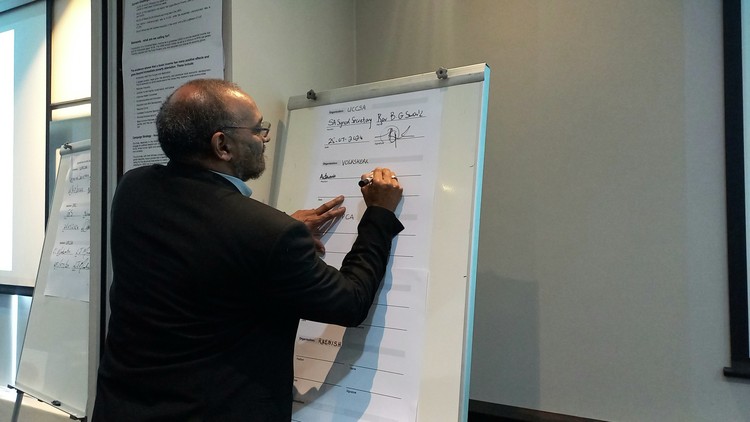
26 July 2024
Volkskerk Church’s Donald Katts was among more than a dozen clergy who represent several major South African church denominations who signed the pledge to support the universal basic income grant on Thursday. Photos: Marecia Damons
Hundreds of churches have joined civil society’s call for the Social Relief of Distress (SRD) grant to be made permanent and become a universal basic income grant (UBIG).
Currently between 7.5 and 8.5-million unemployed adults depend on the R370-a-month SRD grant. This grant is paid directly into a bank account each month. However, there is a monthly check on these accounts to ensure that no other income is being received. Activists have complained that this has allowed SASSA to exclude millions of people who are in fact eligible for the grant.
On Thursday churches part of the World Communion of Reformed Churches (WCRC) pledged to urge the government to implement a UBIG. At an event hosted in Woodstock, Cape Town, the group also launched the Global Reformed Platforms of Engagement (GRAPE) programme, which advocates for “inclusive economic and social transformation”.
During the event clergy members representing dozens of umbrella bodies of churches across South Africa signed the pledge supporting a universal basic income grant. These include the Uniting Reformed Church in Southern Africa, Uniting Presbyterian Church in Southern Africa, Calvin Protestant Church, United Congregational Church of Southern Africa, Volkskerk, the Presbyterian Church of Africa, and Dutch Reformed Church.
The proposed basic income grant would be a cash transfer from the government to citizens aged 18 to 59. While the South African government has expressed support for this, there has been some pushback from big business and the Treasury.
The GRAPE platform aims to mobilise churches and their congregants’ support on social justice issues to address poverty, reduce inequality, and improve education, health, and nutrition. GRAPE is already active in Kenya, advocating for access to clean and safe water.
Reverend Dr Bukelwa Hans, of the GRAPE programme, said, “We consulted with church leaders about joining the universal basic income coalition. That included online workshops, developing activities, consulting with other church leaders, developing more material and then launched today.”
Highlighting the challenges of poverty, inequality and unemployment, Hans said that the UBIG should be offered to individuals instead of a household, and without stringent conditions.
Reverend Dr Bukelwa Hans speaking at the launch of the Global Reformed Platforms of Engagement (GRAPE) initiative on Thursday.
Hans said some of the church leaders visited Otjivero in Namibia where a basic income grant has already been piloted, to assess its impact. “People opened up small businesses and it improved their standard of living,” she said.
Hans criticised the Social Relief of Distress grant for being insufficient to cater to people’s needs. “The church must make a noise when the government isn’t doing the right thing,” she said.
Hans believes the UBIG should at a minimum be R760 per month and then be increased over time.
She said there are many “misconceptions” that the UBIG is unaffordable and will cause beneficiaries to become dependent on the state. “The role of the church will be to clear up these misconceptions. Not everyone is going to use that money to go to the nearest store to buy alcohol. The grant is for local economic development, redistribution of wealth so that people can get their dignity back. This grant will free them from the traps of poverty,” said Hans.
Archbishop Thabo Makgoba, the South African Anglican Archbishop of Cape Town, added that a basic income support grant was crucial to advance economic justice. “Providing a guaranteed minimum level of income frees people from the vicious cycle of poverty. It must be a prerequisite for our country to achieve inclusive economic development,” said Makgoba.
Dr Kelle Howson, senior researcher at the Institute for Economic Justice said the organisation has been keeping track of which political parties had pledged to introduce a BIG during their election campaign.
“We found the majority of those parties in the GNU (government of national unity), committed in their campaigns to either expand social protection or introduce a UBIG,” said Howson.
Our task is to hold them accountable, said Howson.
Nioma Venter representing the Dutch Reformed Church in South Africa said the increase in floods, fires and damaging storms hit vulnerable communities the hardest. “The UBIG can provide a safety net for those whose lives and jobs are affected by these environmental changes.”